Six Canned Mackerels – Sunday story of my life
40 years ago, I was traveling through the Finnish countryside with my dear friend Lea. We were two teenage girls on an adventure, riding a train with barely any money. I had a summer job at a transport office, and like most teenagers, I earned very little. Back then, cash was the only way to pay—there were no credit cards, no internet, and no mobile phones.
My mother had helped us rent a small cottage in the lake district of central Finland. The place was called Nyyssänniemi, a charming little camping area nestled by a serene lake. It had a white sand beach, boats, a sauna, and everything a carefree summer needed. We were 14 years old, poor, excited, and utterly clueless—just Lea and me, ready for our weeklong adventure.
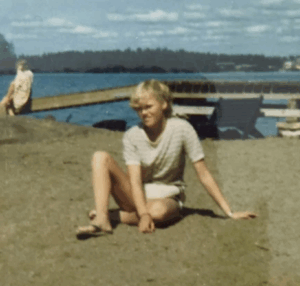
We got off the train in a village called Keuruu and walked to a local market to buy food for the week. The cottage was very basic: no freezer, no running water, and none of the comforts we were used to. So we tried to be smart with our food choices—bread, spaghetti, corn flakes, tomatoes, eggs, some snacks… and six cans of mackerel in tomato sauce. The plan was simple: each morning we’d eat four slices of bread topped with mackerel. No butter, no cheese. Just fish. It felt like a brilliant idea at the time. Later we realized—it really was.
With three plastic bags full of food, we walked several kilometers to the camping area. When we arrived and asked for our cottage, the woman at the reception said, “I’m sorry, but your cottage won’t be available until tomorrow.”
We were devastated. Two teenage girls, with no backup plan, no phone, no money to spare. I got nervous and maybe even cried a little. But then the woman offered us a place to sleep for the night—in the sauna. It was warm, and we were grateful. That night we slept surprisingly well.
The next morning, our first real day began. We finally got the key to our tiny cottage. It had a bunk bed and a small table for two. Nothing more—but what else did we need? We had food, sleeping bags, swimsuits, and a deck of cards. The sun was shining. We swam in the lake, explored the area, and tried to settle in. To be honest, we were a bit disappointed—there were no other teenagers, and the place felt empty.
That evening, we had a clever idea: since it was warmer inside the cottage, we decided to store our food on the small balcony outside, where it was cooler. It seemed like a smart move at the time.
But that night, I barely slept. I kept hearing strange noises—whispers of the forest, rustling leaves, footsteps, or something else entirely. I was scared. My imagination ran wild: animals, spirits, trolls, maybe even a bear. But eventually, the night passed and morning came.
When we stepped outside to get our food, we were horrified. It was gone. Scattered across the forest floor were pieces of spaghetti, smashed eggs, ripped bread, empty packages—everything had been dragged off or destroyed. The night creatures had thrown a feast while we slept. But as we looked closer, we found something miraculous: all six cans of mackerel were still there, intact.
So now we had six days, two growing girls, and six cans of fish. That was it. Luckily, it was July, the season for forest berries. If we got desperate, we could try to catch a fish to go with our mackerel.
That first morning, we opened our first can. No bread left. Just mackerel in tomato sauce.
Later that day, as we were playing cards outside our cottage, we suddenly heard laughter nearby—voices that weren’t Finnish. We listened carefully. German! Young people! Still, we were too shy to approach them.
That night, we heard singing and guitar music coming from the central fireplace area. We gathered all our courage and walked over. There they were—a big German family, grilling sausages and making popcorn. We nervously said hello. They welcomed us with open arms. And we were very hungry!
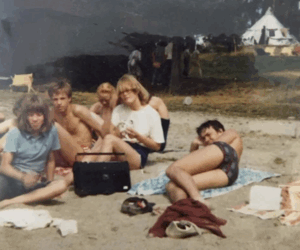
They were teenagers, children, parents, grandparents. And they shared everything with us—sausages, popcorn, laughter, songs. We sang along to German songs as one of the older men played guitar. It turned into one of the most unforgettable nights of my life. We made new friends—Klaus, Sebastian, Christian, Ulf, Annette, and many more.
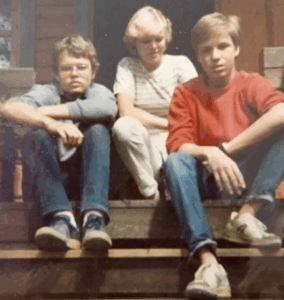
We spent the next few days swimming, playing games, and spending time together. Every evening, we’d gather around the fire to eat and laugh. That was the first time I ever tasted a fire-roasted bun filled with strawberry jam. It was the best thing I had ever eaten.
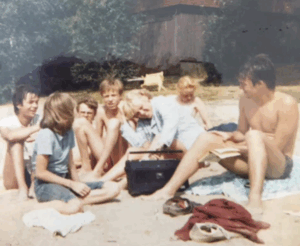
Looking back, I truly believe the Wagener family saved us. Without them, we couldn’t have survived on canned fish alone. We ate it every morning, and in the evenings, they fed us with love.I especially connected with one boy—Christian. He told me his full name: Ernst Christian Dietrich Wagener. I memorized it and swore I’d never forget it. And I never did. We exchanged addresses and started writing letters after the holiday.
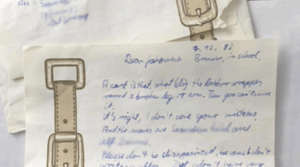
A couple of weeks later, my first letter from Christian arrived. We wrote to each other often—in pour English, sometimes in German. Every letter I received made my day. I always wrote back the same evening. My teenage heart was bursting with feelings. I even wrote about him to the Finnish teen magazine Suosikki. I didn’t even know what I was feeling—maybe I was just missing someone for the first time in my life.
After about a year and 20 letters, I received a letter that crushed me. Christian wrote, “Johanna, I’m sorry. I can’t write to you anymore. But don’t worry—Sebastian will continue.”
WHAT?!?
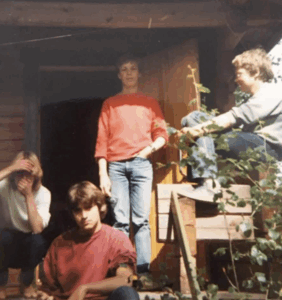
Sebastian?? I didn’t want to write to any Sebastian! He couldn’t just hand me off like that! But he did. And the letters stopped. After a few months, the pain faded.
It became just a beautiful memory. One story among many that shaped who I am. But I never forgot his name. Ernst Christian Dietrich Wagener, from Bremen.
Jazzahead
35 years later, I was at a bar in Helsinki. I started chatting with a man next to me. He turned out to be Peter Schulze, the director of the Jazzahead music event in Bremen. We were both iin the restaurant for Arctic Paradise, a jazz/world music event by Music Finland.
Out of nowhere, I asked him, “Do you happen to know someone named Christian Wagener in Bremen?”
He raised his eyebrows and asked, “Who is this guy?” So I told him the story—not in detail like this, but enough to spark his interest. He was touched and promised to help me find him.
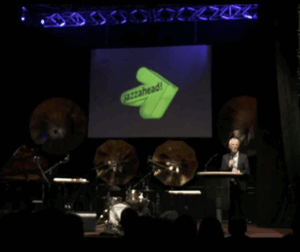
A week later, Peter messaged me: “I just spoke with Christian’s father. I found him.” He gave me Christian’s email address.
I wrote to him. He remembered me. We made plans to meet the following April, when my husband and I would be in Bremen for Jazzahead.
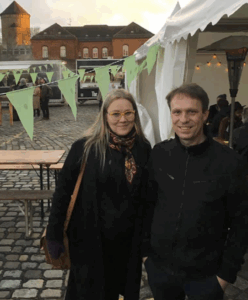
We met—me, my husband, Christian, and Christian’s wife Nicole. We talked about those unforgettable days in 1982. I asked him why he stopped writing. He didn’t remember.
Today, Christian is a musician—he plays trombone in a jazz quintet, two big bands, and even a salsa band. Nicole was warm and welcoming from the very first hug. They have three beautiful sons. I’m happy the story found a happy ending.
Before we said goodbye, I finally told Christian something I had never said before: Your family saved our lives. Without you, Lea and I might not have made it through that week. You made our holiday unforgettable.
This is a story about connection.
A story about kindness.
And the story of how two girls survived a week with only six canned mackerels .
Thank you:
Peter Schulze
Jazzahead
Music Finland
Lea
Nyyssänniemi camping
My husband Perttu
Ulf, Sebastian, Annette
And of course, Nicole, Christian, and the whole Wagener family.
